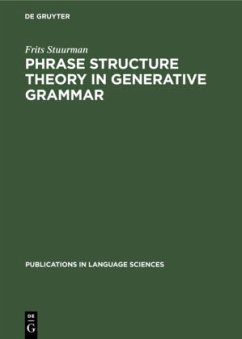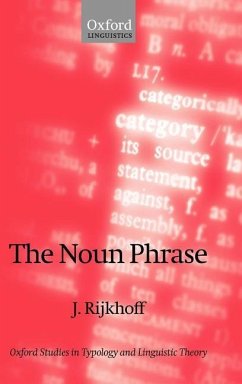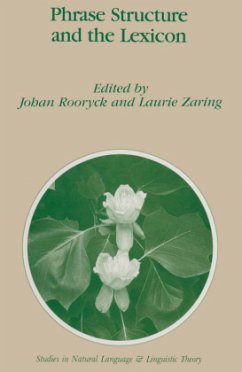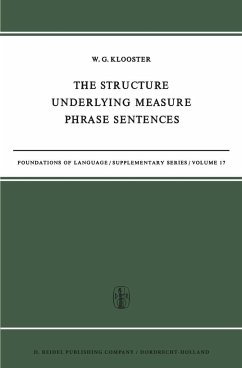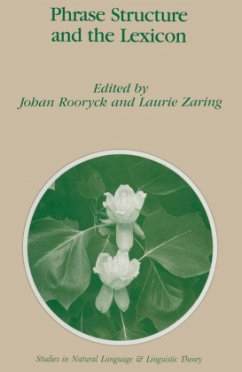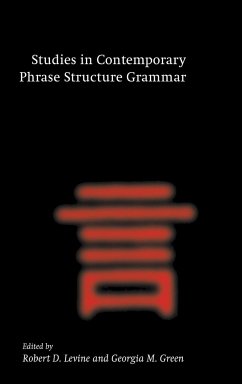
Studies in Contemporary Phrase Structure Grammar
Versandkostenfrei!
Versandfertig in 1-2 Wochen
119,99 €
inkl. MwSt.

PAYBACK Punkte
60 °P sammeln!
This book explores a wide variety of theoretically central issues in the framework of Head-Driven Phrase Structure Grammar (HPSG), a major theory of syntactic representation which is becoming increasingly dominant, particularly in the domain of natural language computation. HPSG is a strongly lexicon-driven theory, like several others on the current scene, but unlike the others it also relies heavily on an explicit assignment of linguistic objects to membership in a hierarchically organized network of types, where constraints associated with any given type are inherited by all of its subtypes....
This book explores a wide variety of theoretically central issues in the framework of Head-Driven Phrase Structure Grammar (HPSG), a major theory of syntactic representation which is becoming increasingly dominant, particularly in the domain of natural language computation. HPSG is a strongly lexicon-driven theory, like several others on the current scene, but unlike the others it also relies heavily on an explicit assignment of linguistic objects to membership in a hierarchically organized network of types, where constraints associated with any given type are inherited by all of its subtypes. This theoretical architecture allows HPSG considerable flexibility within the confines of a highly restrictive, mathematically explicit formalism, requiring no derivational machinery and invoking only a single level of syntactic representation. The separate chapters consider a variety of problematic phenomena in German, Japanese and English and suggest important extensions of, and revisions to, the current picture of HPSG.
Table of contents:
Introduction Georgia M. Green and Robert D. Levine; 1. The lexical integrity of Japanese causatives Christopher Manning, Ivan Sag and Masayo Iida; 2. A syntax and semantics for purposive adjuncts in HPSG Michael Johnston; 3. On lexicalist treatments of Japanese causatives Takao Gunji; 4. 'Modal flip' and partial Verb Phrase fronting in German Kathryn L. Baker; 5. A lexical comment on a syntactic topic Kazuhiko Fukushima; 6. Agreement and the Syntax-Morphology Interface in HPSG Andreas Kathol; 7. Partial VP and split NP topicalization in German: an HPSG analysisErhard W. Hinrichs and Tsuneko Nakazawa.
This book explores a variety of central issues in Head-Driven Phrase Structure Grammar (HPSG), a theory of syntactic representation which is becoming increasingly dominant, particularly in natural language computation. It considers problematic phenomena in German, Japanese and English and suggests extensions of, and revisions to, the current picture of HPSG.
This book proposes revisions to the current picture of Head-Driven Phrase Structure Grammar.
Table of contents:
Introduction Georgia M. Green and Robert D. Levine; 1. The lexical integrity of Japanese causatives Christopher Manning, Ivan Sag and Masayo Iida; 2. A syntax and semantics for purposive adjuncts in HPSG Michael Johnston; 3. On lexicalist treatments of Japanese causatives Takao Gunji; 4. 'Modal flip' and partial Verb Phrase fronting in German Kathryn L. Baker; 5. A lexical comment on a syntactic topic Kazuhiko Fukushima; 6. Agreement and the Syntax-Morphology Interface in HPSG Andreas Kathol; 7. Partial VP and split NP topicalization in German: an HPSG analysisErhard W. Hinrichs and Tsuneko Nakazawa.
This book explores a variety of central issues in Head-Driven Phrase Structure Grammar (HPSG), a theory of syntactic representation which is becoming increasingly dominant, particularly in natural language computation. It considers problematic phenomena in German, Japanese and English and suggests extensions of, and revisions to, the current picture of HPSG.
This book proposes revisions to the current picture of Head-Driven Phrase Structure Grammar.








